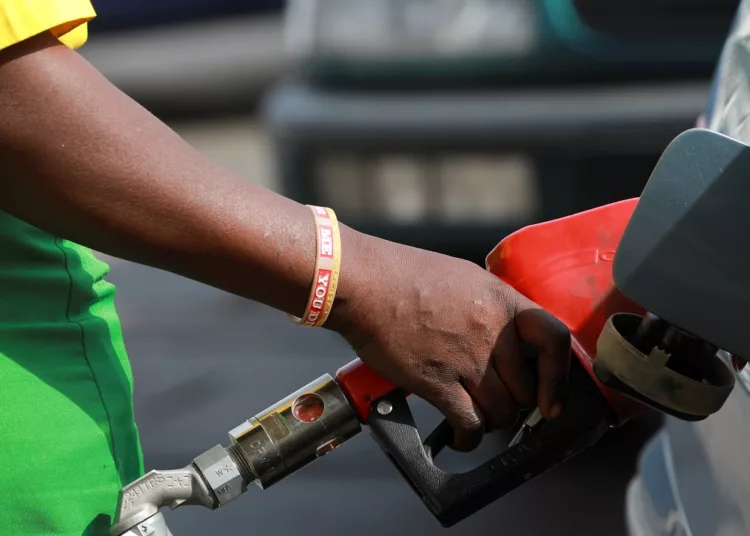Dangote And NNPC: The Impact On Petrol Prices In Nigeria

Table of Contents
Dangote Refinery's Potential Impact on Petrol Prices
The commissioning of the Dangote Refinery, one of the largest single-train refineries globally, represents a significant turning point for Nigeria's energy sector. Its potential impact on petrol prices is multifaceted and far-reaching.
Increased Domestic Refining Capacity
Dangote Refinery's massive refining capacity aims to dramatically reduce Nigeria's dependence on imported petrol. This shift promises significant benefits:
- Expected daily output: The refinery boasts a projected daily output of 650,000 barrels of refined petroleum products, including gasoline, diesel, and kerosene.
- Reduction in import bills: Reduced reliance on imports will drastically lower Nigeria's foreign exchange expenditure on fuel, strengthening the Naira and freeing up funds for other developmental projects.
- Potential for job creation: The refinery's operation is expected to create thousands of direct and indirect jobs, boosting employment opportunities across various sectors.
- Impact on foreign exchange reserves: Lower import costs will positively impact Nigeria's foreign exchange reserves, enhancing the country's economic stability.
Competition and Price Regulation
The entry of such a large player as the Dangote Refinery into the Nigerian petroleum market is expected to significantly increase competition. This increased competition could lead to lower petrol prices for consumers.
- Market dynamics: A competitive market typically results in price adjustments to attract consumers. Dangote's pricing strategies will play a crucial role in determining the extent of price reductions.
- Potential price wars: The possibility of price wars between Dangote Refinery and existing players cannot be discounted, potentially benefiting consumers in the short term.
- Government regulation's role: The Nigerian government's regulatory framework will play a vital role in ensuring fair competition and preventing anti-competitive practices. Price controls or deregulation policies will significantly affect the outcome.
- Impact of deregulation: A fully deregulated market would allow for more flexible pricing, potentially leading to quicker price adjustments based on market forces.
Challenges to Achieving Lower Prices
While the potential for lower petrol prices is significant, several challenges could hinder the immediate impact of the Dangote Refinery:
- Operational challenges: Initial operational hiccups, unforeseen technical issues, or inefficiencies could delay the refinery's full production capacity and impact its ability to immediately lower prices.
- Feedstock costs: The cost of crude oil, the refinery's primary feedstock, fluctuates globally. High crude oil prices could offset potential savings from reduced import costs.
- Logistical hurdles: Efficient distribution networks are essential to ensure that refined petroleum products reach consumers nationwide. Logistical bottlenecks could hinder price reductions.
- Potential for government interference: Government intervention, through subsidies or price controls, could counteract the market's natural price-regulating mechanisms.
NNPC's Role and Influence on Petrol Prices
The Nigerian National Petroleum Corporation (NNPC) has historically played a dominant role in Nigeria's petroleum sector, significantly influencing petrol prices.
NNPC's Subsidy Regime
For years, NNPC has been involved in a petrol subsidy regime, which aimed to keep prices artificially low for consumers. However, this has placed a significant burden on the government's finances:
- Costs of subsidies: The cost of petrol subsidies has been substantial, diverting funds from other critical sectors like education and healthcare.
- Impact on the budget: Subsidies have often led to budget deficits and placed pressure on government finances.
- Transparency concerns: Concerns have been raised about the transparency and accountability of the subsidy regime, with allegations of mismanagement and corruption.
- Calls for subsidy removal: There have been consistent calls for the removal of petrol subsidies to improve fiscal discipline and allocate resources more efficiently.
NNPC's Market Dominance and Competition
NNPC's historical market dominance has had implications for competition in the sector:
- Market share: NNPC has historically held a significant market share, limiting competition and potentially affecting price setting.
- Impact on price setting: The corporation's influence on price setting has been a subject of debate, with concerns about its impact on consumer prices.
- Potential for anti-competitive practices: There have been concerns about potential anti-competitive practices hindering the entry of new players into the market.
- Need for market liberalization: Further liberalization of the petroleum market is crucial to foster competition and ensure fair pricing.
NNPC's Collaboration with Dangote Refinery
The relationship between NNPC and Dangote Refinery will significantly impact the fuel market. Potential collaborations could include:
- Potential for joint ventures: Joint ventures could leverage the strengths of both entities, fostering efficiency and ensuring a smoother transition to a more competitive market.
- Distribution networks: Collaboration on distribution networks could ensure efficient nationwide distribution of refined petroleum products, reducing transportation costs.
- Supply agreements: Strategic supply agreements could guarantee a stable supply of crude oil to the Dangote Refinery and ensure consistent production.
- Implications for price stability: Effective collaboration could contribute to greater price stability and affordability of petrol for consumers.
The Interplay Between Dangote and NNPC in Shaping Petrol Prices
The dynamic interplay between Dangote Refinery and NNPC will be crucial in determining the future of petrol prices in Nigeria.
Synergy or Conflict?
The potential for synergy or conflict between these two entities is significant:
- Cooperative versus competitive strategies: Whether they choose to cooperate or compete will greatly influence petrol prices. Cooperation could lead to price stability, while competition could lead to price wars.
- Impact on consumer prices: The ultimate impact on consumer prices depends largely on the nature of their interaction – collaborative or competitive.
- Potential for government intervention: The government's role in regulating the market and mediating any conflicts will be critical in ensuring fair prices for consumers.
Long-Term Outlook for Petrol Prices in Nigeria
The long-term outlook for petrol prices in Nigeria hinges on several factors:
- Price stability: The aim is to achieve greater price stability, reducing the volatility that has characterized the market in the past.
- Affordability: Affordability remains a key concern for consumers, and the combined actions of Dangote and NNPC should aim to ensure that petrol remains accessible.
- Energy security: Reducing reliance on imports enhances Nigeria's energy security, making the country less vulnerable to global price fluctuations.
- Implications for economic growth: Stable and affordable petrol prices are essential for economic growth, fostering industrial development and reducing the cost of doing business.
Conclusion
The interplay between Dangote Refinery and NNPC will significantly influence petrol prices in Nigeria. While Dangote Refinery holds the potential to significantly reduce reliance on imports and increase competition, leading to lower prices, several challenges and the ongoing role of NNPC remain. The success of achieving lower and more stable petrol prices hinges on effective collaboration, transparent market practices, and a well-regulated environment. Further monitoring of the relationship between Dangote and NNPC, and their individual and combined impact on the Nigerian fuel market, is crucial. To stay informed about the latest developments impacting Dangote, NNPC, and Petrol Prices in Nigeria, continue following news and analyses on this vital sector.

Featured Posts
-
 Indonesia Reserve Drop Rupiah Depreciation Impacts Foreign Exchange Holdings
May 10, 2025
Indonesia Reserve Drop Rupiah Depreciation Impacts Foreign Exchange Holdings
May 10, 2025 -
 Benson Boone On Allegations Of Imitating Harry Styles Style
May 10, 2025
Benson Boone On Allegations Of Imitating Harry Styles Style
May 10, 2025 -
 Nyt Strands Puzzle 377 Complete Answers And Hints March 15
May 10, 2025
Nyt Strands Puzzle 377 Complete Answers And Hints March 15
May 10, 2025 -
 Overtime Thriller Draisaitls 100 Points Power Oilers Past Islanders
May 10, 2025
Overtime Thriller Draisaitls 100 Points Power Oilers Past Islanders
May 10, 2025 -
 Draisaitls Injury Recovery Will The Oilers Star Make The Playoffs
May 10, 2025
Draisaitls Injury Recovery Will The Oilers Star Make The Playoffs
May 10, 2025
